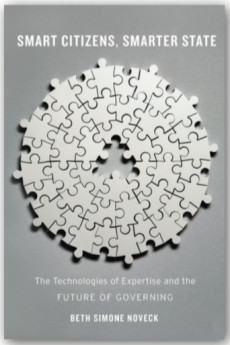
Smart Citizens, Smarter State: The Technologies of Expertise and the Future of Governing
Beth Simone Noveck
352 pages, Harvard University Press, 2015
In a clear illustration of why “the perfect is the enemy of the good,” as the old saying goes, professional expertise often seems to interfere with more obvious, informal, and efficient solutions to public problems. At least, that’s the case that Beth Simone Noveck makes in Smart Citizens, Smarter State. Noveck believes that new technologies have great potential to improve governance, but only if governments can draw from the “good” wisdom of informed crowds and not rely exclusively on the “perfect” information of credentialed experts.
Currently, Noveck writes, the US government’s dependence on experts establishes a “false dichotomy between reliance on a professional elite or on an ignorant citizenry.” As a result, many government programs are insulated from broader public input. This state of affairs is particularly counterproductive because, given the rate at which today’s information technologies are improving, broader participation is crucial not only to democratic governance but also to more efficient solutions to public problems.
Noveck takes a gloomy view of government’s current barriers to the uptake of new, participatory approaches but is optimistic about the future potential for public input. She is in a good position to evaluate these prospects: Not only has she studied the crowdsourcing tools she advocates while teaching at New York University and the Massachusetts Institute of Technology—she also has furthered their development as director of the Obama White House’s Open Government Initiative and advisor to David Cameron’s Open Government team. She currently directs NYU’s Governance Lab, which is attempting to put theory into practice through programs such as a networking hub among experts on open data, education, and other topics.
As I read Noveck’s book, I found myself thinking of a time, years ago, when I served on the National Institute of Justice’s (NIJ) peer review panels on criminal justice research requests. Paragons of professionalism, these panels employed some of the best minds in criminology to evaluate government-solicited studies on criminal justice problems. The process moved slowly and relied almost exclusively on specialists.
This sort of system is important, but it ignores the broad array of other people with day-to-day experience who could offer enormous insight on the very same issues—a point that becomes alarmingly clear in Noveck’s book. One chapter, titled “Why Smarter Governance May Be Illegal,” details the many dispiriting mechanisms that restrict government’s ability to listen to crowds. The Federal Advisory Committee Act of 1972, for example, limited the number of groups qualified to advise federal agencies to a narrow field of credentialed experts. The Paperwork Reduction Act of 1980 imposed a lengthy application and approval process on agencies wishing to collect records of public input.
Noveck’s analysis on this point reminded me of the responses I received as chairman of the Corporation for National and Community Affairs to my proposal that we conduct exit surveys with AmeriCorps members about their experiences. I assumed these surveys would guide our grantmaking and assist future volunteers in making their placement decisions. But the idea met strong resistance from the Paperwork Reduction enforcement regime, which delayed the proposal by about a year while watering it down along the way.
The professionals who evaluated grants, meanwhile, showed a discouraging lack of enthusiasm for my idea. Their roles were not designed to be receptive to new ways of operating, and the institutional culture inhibited experimentation. Noveck pays particular attention to this hurdle—one that many of us who specialize in state and local government regularly confront. “The real source of worry is less corruption and self-interest … than the inability to apply the full range of relevant, available expertise to our most pressing challenges,” she writes. Tools that amplify crowd wisdom and open source expertise, after all, are effective only if accompanied by a fundamental shift in attitudes toward creativity and flexibility. Unfortunately, changing culture is much more difficult.
The core challenge Noveck raises, however, is relevant to a broad range of public interest professionals. As government agencies review how to solicit and shape public knowledge, they must also rethink what, exactly, sets the credentialed experts apart. Noveck identifies substantial potential for change in this area and encourages public thinkers and officials to be more nimble, efficient, and inclusive in their views of what constitutes knowledge. She also advocates conducting the business of government in closer alignment with the cutting edge of technology. If we are serious about building a genuinely democratic community of knowledge-makers, we ought to take her recommendations to heart.

